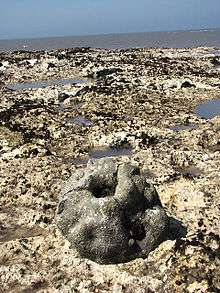Paramoudra
| Sedimentary rock | |
 Paramoudra on chalk outcrop, Norfolk, England. | |
| Composition | |
|---|---|
| Flint, a type of silica, (chemical formula Si02) |
Paramoudras, Paramoudra flints, Pot stones or Potstones are flint nodules found mainly in parts of north-west Europe: Norfolk (United Kingdom), Ireland, Denmark, Spain and Germany. In Norfolk they are known as Pot Stones and can be found on the beach below Beeston Bump just outside Beeston Regis. In Ireland they are known as Paramoudras.
Pot Stones are flint nodules with a hollow center and have the appearance of a doughnut (torus). They can be found in columns resembling a backbone.
These flints are trace fossils of the burrows of an organism otherwise unknown except for these relics sometimes referred to as Bathicnus paramoudrae. [1] [2]
Notes
- ↑ Chalk: proceedings of the International Chalk Symposium held at Brighton Polytechnic on 4-7 September 1989, Volume 1989. Thomas Telford. 1990. p. 135. ISBN 978-0-7277-1541-8.
- ↑ Mortimer, R N; B Pomerol (1987). "Correlation of the Upper Cretaceous White Chalk (Turonian to Campanian) in the Anglo-Paris Basin". Proceedings of the Geologists' Association. 98 (2): 97–143. doi:10.1016/s0016-7878(87)80001-9.
External links
| Wikimedia Commons has media related to Paramoudra. |
- Norfolk Museums Beeston Regis-West Runton - paramoudra flints
- geography,org Paramoudra on chalk outcrop
This article is issued from Wikipedia - version of the 12/31/2015. The text is available under the Creative Commons Attribution/Share Alike but additional terms may apply for the media files.